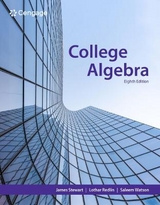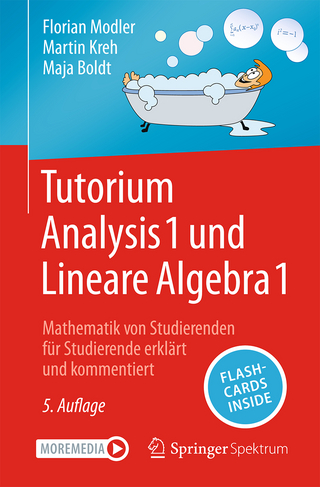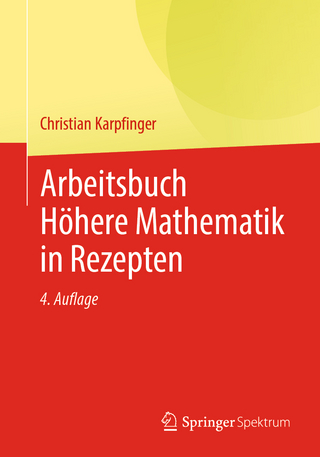
College Algebra
Brooks/Cole (Verlag)
978-1-305-11554-5 (ISBN)
- Titel erscheint in neuer Auflage
- Artikel merken
Learn to think mathematically and develop genuine problem-solving skills with COLLEGE ALGEBRA, Seventh Edition. This straightforward and easy-to-use book will help you learn the fundamentals of algebra in a variety of practical ways. The book features new tools to help you succeed, such as learning objectives before each section to prepare you for what you're about to learn, and a list of formulas and key concepts after each section that help reinforce what you've learned. In addition, the book includes many real-world examples that show you how mathematics is used to model in fields like engineering, business, physics, chemistry, and biology.
The late James Stewart received his M.S. from Stanford University and his Ph.D. from the University of Toronto. He conducted research at the University of London and was influenced by the famous mathematician, George Polya, at Stanford University. Dr. Stewart most recently served as a professor of mathematics at McMaster University and the University of Toronto. His research focused on harmonic analysis. Dr. Stewart authored the best-selling calculus textbook series, including CALCULUS, CALCULUS: EARLY TRANSCENDENTALS and CALCULUS: CONCEPTS AND CONTEXTS, as well as a series of successful precalculus texts and college algebra and trigonometry texts. The late Lothar Redlin grew up on Vancouver Island and received a bachelor of science degree from the University of Victoria and a Ph.D. from McMaster University. He subsequently did research and taught at the University of Washington and the University of Waterloo as well as California State University, Long Beach. He was most recently a professor of mathematics at The Pennsylvania State University, Abington Campus. His research focused on topology. Dr. Redlin was a valued co-author for Dr. Stewart's best-selling calculus textbook series and his popular precalculus, college algebra and trigonometry texts. Saleem Watson received his bachelor of science degree from Andrews University in Michigan. He completed his graduate studies at Dalhousie University and McMaster University, where he received his Ph.D. Dr. Watson conducted subsequently research at the Mathematics Institute of the University of Warsaw in Poland. He taught mathematics at Pennsylvania State University before serving at California State University, Long Beach, where he is currently professor emeritus. Dr. Watson's research encompasses the field of functional analysis. Dr. Watson is an important co-author for Dr. Stewart's best-selling calculus textbook series as well as his popular precalculus, college algebra and trigonometry texts.
Preface.
To the Student.
Prologue: Principles of Problem Solving.
P. PREREQUISITES.
P.1 Modeling the Real-World with Algebra. P.2 The Real Numbers. P.3 Integer Exponents and Scientific Notation. P.4 Rational Exponents and Radicals. P.5 Algebraic Expressions. P.6 Factoring. P.7 Rational Expressions. P.8 Solving Basic Equations. P.9 Modeling with Equations. Chapter P Review. Chapter P Test.
FOCUS ON MODELING: Making the Best Decisions.
1. EQUATIONS AND GRAPHS.
1.1 The Coordinate Plane. 1.2 Graphs of Equations in Two Variables; Circles. 1.3 Lines.
1.4 Solving Quadratic Equations. 1.5 Complex Numbers. 1.6 Solving Other Types of Equations. 1.7 Solving Inequalities. 1.8 Solving Absolute Value Equations and Inequalities. 1.9 Solving Equations and Inequalities Graphically. 1.10 Modeling Variations. Chapter 1 Review. Chapter 1 Test.
FOCUS ON MODELING: Fitting Lines to Data.
2. FUNCTIONS.
Chapter Overview.
2.1 Functions. 2.2 Graphs of Functions. 2.3 Getting Information from the Graph of a Function. 2.4 Average Rate of Change of a Function. 2.5 Linear Functions and Models.
2.6 Transformations of Functions. 2.7 Combining Functions. 2.8 One-to-One Functions and Their Inverses. Chapter 2 Review. Chapter 2 Test.
FOCUS ON MODELING: Modeling with Functions.
3. POLYNOMIAL AND RATIONAL FUNCTIONS.
Chapter Overview.
3.1 Quadratic Functions and Models. 3.2 Polynomial Functions and Their Graphs. 3.3 Dividing Polynomials. 3.4 Real Zeros of Polynomials. 3.5 Complex Zeros and the Fundamental Theorem of Algebra. 3.6 Rational Functions. 3.7 Polynomial and Rational Inequalities. Chapter 3 Review. Chapter 3 Test.
FOCUS ON MODELING: Fitting Polynomial Curves to Data.
4. EXPONENTIAL AND LOGARITHMIC FUNCTIONS.
Chapter Overview.
4.1 Exponential Functions. 4.2 The Natural Exponential Function. 4.3 Logarithmic Functions. 4.4 Laws of Logarithms. 4.5 Exponential and Logarithmic Equations. 4.6 Modeling with Exponential Functions. 4.7 Logarithmic Scales. Chapter 4 Review. Chapter 4 Test.
FOCUS ON MODELING: Fitting Exponential and Power Curves to Data.
5. SYSTEMS OF EQUATIONS AND INEQUALITIES.
5.1 Systems of Linear Equations in Two Variables. 5.2 Systems of Linear Equations in Several Variables. 5.3 Partial Fractions. 5.4 Systems of Nonlinear Equations. 5.5 Systems of Inequalities. Chapter 5 Review. Chapter 5 Test.
FOCUS ON MODELING: Linear Programming.
6. MATRICES AND DETERMINANTS.
6.1 Matrices and Systems of Linear Equations. 6.2 The Algebra of Matrices. 6.3 Inverses of Matrices and Matrix Equations. 6.4 Determinants and Cramer's Rule. Chapter 6 Review. Chapter 6 Test.
FOCUS ON MODELING: Computer Graphics.
7. CONIC SECTIONS.
7.1 Parabolas. 7.2 Ellipses. 7.3 Hyperbolas. 7.4 Shifted Conics. Chapter 7 Review.
Chapter 7 Test.
FOCUS ON MODELING: Conics in Architecture.
8. SEQUENCES AND SERIES.
8.1 Sequences and Summation Notation. 8.2 Arithmetic Sequences. 8.3 Geometric Sequences. 8.4 Mathematics of Finance. 8.5 Mathematical Induction. 8.6 The Binomial Theorem. Chapter 8 Review. Chapter 8 Test.
FOCUS ON MODELING: Modeling with Recursive Sequences.
9. COUNTING AND PROBABILITY.
9.1 Counting. 9.2 Probability. 9.3 Binomial Probability. 9.4 Expected Value. Chapter 9 Review. Chapter 9 Test.
FOCUS ON MODELING: The Monte Carlo Method.
APPENDIX A: Calculations and Significant Figures.
APPENDIX B: Graphing with a Graphing Calculator.
APPENDIX C: Using the TI-83/84 Graphing Calculator.
| Verlagsort | CA |
|---|---|
| Sprache | englisch |
| Maße | 216 x 34 mm |
| Gewicht | 1860 g |
| Themenwelt | Mathematik / Informatik ► Mathematik ► Algebra |
| ISBN-10 | 1-305-11554-6 / 1305115546 |
| ISBN-13 | 978-1-305-11554-5 / 9781305115545 |
| Zustand | Neuware |
| Informationen gemäß Produktsicherheitsverordnung (GPSR) | |
| Haben Sie eine Frage zum Produkt? |
aus dem Bereich



